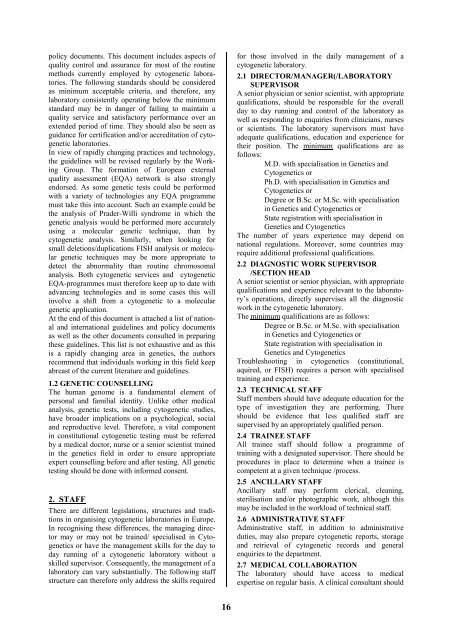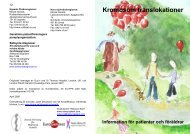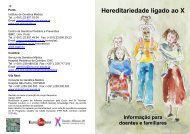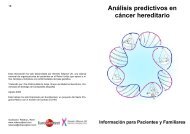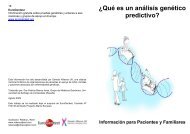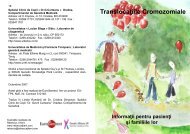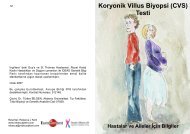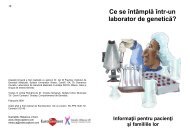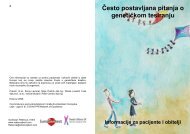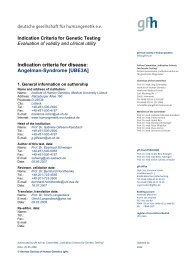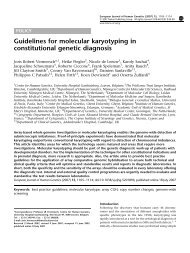Cytogenetic Guidelines and Quality Assurance - EuroGentest
Cytogenetic Guidelines and Quality Assurance - EuroGentest
Cytogenetic Guidelines and Quality Assurance - EuroGentest
You also want an ePaper? Increase the reach of your titles
YUMPU automatically turns print PDFs into web optimized ePapers that Google loves.
policy documents. This document includes aspects of<br />
quality control <strong>and</strong> assurance for most of the routine<br />
methods currently employed by cytogenetic laboratories.<br />
The following st<strong>and</strong>ards should be considered<br />
as minimum acceptable criteria, <strong>and</strong> therefore, any<br />
laboratory consistently operating below the minimum<br />
st<strong>and</strong>ard may be in danger of failing to maintain a<br />
quality service <strong>and</strong> satisfactory performance over an<br />
extended period of time. They should also be seen as<br />
guidance for certification <strong>and</strong>/or accreditation of cytogenetic<br />
laboratories.<br />
In view of rapidly changing practices <strong>and</strong> technology,<br />
the guidelines will be revised regularly by the Working<br />
Group. The formation of European external<br />
quality assessment (EQA) network is also strongly<br />
endorsed. As some genetic tests could be performed<br />
with a variety of technologies any EQA programme<br />
must take this into account. Such an example could be<br />
the analysis of Prader-Willi syndrome in which the<br />
genetic analysis would be performed more accurately<br />
using a molecular genetic technique, than by<br />
cytogenetic analysis. Similarly, when looking for<br />
small deletions/duplications FISH analysis or molecular<br />
genetic techniques may be more appropriate to<br />
detect the abnormality than routine chromosomal<br />
analysis. Both cytogenetic services <strong>and</strong> cytogenetic<br />
EQA-programmes must therefore keep up to date with<br />
advancing technologies <strong>and</strong> in some cases this will<br />
involve a shift from a cytogenetic to a molecular<br />
genetic application.<br />
At the end of this document is attached a list of national<br />
<strong>and</strong> international guidelines <strong>and</strong> policy documents<br />
as well as the other documents consulted in preparing<br />
these guidelines. This list is not exhaustive <strong>and</strong> as this<br />
is a rapidly changing area in genetics, the authors<br />
recommend that individuals working in this field keep<br />
abreast of the current literature <strong>and</strong> guidelines.<br />
1.2 GENETIC COUNSELLING<br />
The human genome is a fundamental element of<br />
personal <strong>and</strong> familial identity. Unlike other medical<br />
analysis, genetic tests, including cytogenetic studies,<br />
have broader implications on a psychological, social<br />
<strong>and</strong> reproductive level. Therefore, a vital component<br />
in constitutional cytogenetic testing must be referred<br />
by a medical doctor, nurse or a senior scientist trained<br />
in the genetics field in order to ensure appropriate<br />
expert counselling before <strong>and</strong> after testing. All genetic<br />
testing should be done with informed consent.<br />
2. STAFF<br />
There are different legislations, structures <strong>and</strong> traditions<br />
in organising cytogenetic laboratories in Europe.<br />
In recognising these differences, the managing director<br />
may or may not be trained/ specialised in <strong>Cytogenetic</strong>s<br />
or have the management skills for the day to<br />
day running of a cytogenetic laboratory without a<br />
skilled supervisor. Consequently, the management of a<br />
laboratory can vary substantially. The following staff<br />
structure can therefore only address the skills required<br />
16<br />
for those involved in the daily management of a<br />
cytogenetic laboratory.<br />
2.1 DIRECTOR/MANAGER(/LABORATORY<br />
SUPERVISOR<br />
A senior physician or senior scientist, with appropriate<br />
qualifications, should be responsible for the overall<br />
day to day running <strong>and</strong> control of the laboratory as<br />
well as responding to enquiries from clinicians, nurses<br />
or scientists. The laboratory supervisors must have<br />
adequate qualifications, education <strong>and</strong> experience for<br />
their position. The minimum qualifications are as<br />
follows:<br />
M.D. with specialisation in Genetics <strong>and</strong><br />
<strong>Cytogenetic</strong>s or<br />
Ph.D. with specialisation in Genetics <strong>and</strong><br />
<strong>Cytogenetic</strong>s or<br />
Degree or B.Sc. or M.Sc. with specialisation<br />
in Genetics <strong>and</strong> <strong>Cytogenetic</strong>s or<br />
State registration with specialisation in<br />
Genetics <strong>and</strong> <strong>Cytogenetic</strong>s<br />
The number of years experience may depend on<br />
national regulations. Moreover, some countries may<br />
require additional professional qualifications.<br />
2.2 DIAGNOSTIC WORK SUPERVISOR<br />
/SECTION HEAD<br />
A senior scientist or senior physician, with appropriate<br />
qualifications <strong>and</strong> experience relevant to the laboratory’s<br />
operations, directly supervises all the diagnostic<br />
work in the cytogenetic laboratory.<br />
The minimum qualifications are as follows:<br />
Degree or B.Sc. or M.Sc. with specialisation<br />
in Genetics <strong>and</strong> <strong>Cytogenetic</strong>s or<br />
State registration with specialisation in<br />
Genetics <strong>and</strong> <strong>Cytogenetic</strong>s<br />
Troubleshooting in cytogenetics (constitutional,<br />
aquired, or FISH) requires a person with specialised<br />
training <strong>and</strong> experience.<br />
2.3 TECHNICAL STAFF<br />
Staff members should have adequate education for the<br />
type of investigation they are performing. There<br />
should be evidence that less qualified staff are<br />
supervised by an appropriately qualified person.<br />
2.4 TRAINEE STAFF<br />
All trainee staff should follow a programme of<br />
training with a designated supervisor. There should be<br />
procedures in place to determine when a trainee is<br />
competent at a given technique /process.<br />
2.5 ANCILLARY STAFF<br />
Ancillary staff may perform clerical, cleaning,<br />
sterilisation <strong>and</strong>/or photographic work, although this<br />
may be included in the workload of technical staff.<br />
2.6 ADMINISTRATIVE STAFF<br />
Administrative staff, in addition to administrative<br />
duties, may also prepare cytogenetic reports, storage<br />
<strong>and</strong> retrieval of cytogenetic records <strong>and</strong> general<br />
enquiries to the department.<br />
2.7 MEDICAL COLLABORATION<br />
The laboratory should have access to medical<br />
expertise on regular basis. A clinical consultant should


